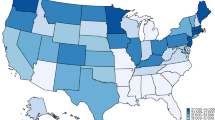Abstract
The COVID-19 pandemic has shown once again that it is often the poor who suffer from economic downturn in times of crisis. As was the case in the financial crisis of 2008, we now have an opportunity to rethink the role of consumer credit in society and design and create a legal framework that adequately reflects that role. The following thought experiment hopes to give impetus to legal reforms.
Article PDF
Similar content being viewed by others
Avoid common mistakes on your manuscript.
Literatur
Blair, T. und G. Schröder (1998), Europe: the Third Way/die Neue Mitte, Friedrich-Ebert-Stiftung, Friedrich-Ebert Foundation South Africa Working Documents, 2.
Castles, F. G., S. Leibfried, J. Lewis, H. Obinger und P. Pierson (2010), Introduction, in F. G. Castles et al. (Hrsg.), Oxford Handbook of the Welfare State, Oxford University Press, 8 ff.
Domurath, I. (2017), Consumer Vulnerability and Welfare in Mortgage Contracts, Hart.
Lüttringhaus, J. D. (2013), Verhandlungspflichten bei Störung der Geschäftsgrundlage: Ein Beitrag zur Dogmatik und Durchsetzung von Anpassungsanspruch und Verhandlungspflichten nach § 313 Abs. 1 BGB, Archiv für die civilistische Praxis, 213(2), 266–298.
McLeay, M., A. Radia, und R. Thomas (2014), Money creation in the modern economy, Quarterly Bulletin, Q1, Bank of England.
Mertens, D. (2017) Borrowing for social security? Credit, asset-based welfare and the decline of the German savings regime, Journal of European Social Policy, 27(5), 474–490.
Nullmeier, F. and F. X. Kaufmann (2010), Post-War Welfare State Development, in F. G. Castles et al. (Hrsg.), Oxford Handbook of the Welfare State, Oxford, Oxford University Press, 81 ff.
Pierson, P. (1994), Dismantling the Welfare State? Reagan, Thatcher, and the Politics of Retrenchment, Cambridge University Press.
Prasad, M. (2012), The Land of Too Much — American Abundance and the Paradox of Poverty, Harvard University Press.
Prasad, M. (2019), The Trade-Off between Social Insurance and Financialization: Is There a Better Way?, Niskanen Center Policy Essay.
Pulgar, J. (2014), A Contractual Approach to Over-Indebtedness: Rebus Sic Stantibus Instead of Bankruptcy, in Nogler und Reifner (Hrsg.), Life Time Contracts — Social long-term contracts in labour, tenancy and consumer credit law, Eleven Publishing.
Reifner, U. (2015), Thesen zur Dogmatik eines sozialen Nutzungsvertrages (Life-Time Contract), in K.-O. Knops et al. (Hrsg.), Zivilrecht im Wandel, Springer.
Roggemann, H., H. Klinger, A. Fandrich, N. Korff, S. Peters, U. Reifner und I. Größl (2021), Gutachten zum produktiven Kredit, Verbraucherzentrale Bundesverband, Institut für Finanzdienstleistungen.
Schröder, G. (2003), Regierungserklärung, 14. März 2003, Deutscher Bundestag, Plenarprotokoll, 15/32, Agenda 2010.
Strange, S. (2015), States and Markets, Bloomsbury.
Thole, C. (2014), Renaissance der Lehre von der Neuverhandlungspflicht bei § 313 BGB?, JuristenZeitung (JZ), 69/9, 443–450.
Twigg-Flesner, C. et al. (2020), Consumer Law and Policy Relating to Change of Circumstances Due to the COVID-19 Pandemic, Journal of Consumer Policy, 43, 437–450.
Wilhelmsson, T. (1990), Social force majeure — a new concept in Nordic Consumer Law, Journal of Consumer Policy, 13, 1–14.
Author information
Authors and Affiliations
Additional information
Dr. Irina Domurath ist Associate Professor of Law an der Universidad Central de Chile.
Rights and permissions
Open Access: Dieser Artikel wird unter der Creative Commons Namensnennung 4.0 International Lizenz veröffentlicht (https://creativecommons.org/licenses/by/4.0/deed.de).
Open Access wird durch die ZBW — Leibniz-Informationszentrum Wirtschaft gefördert.




